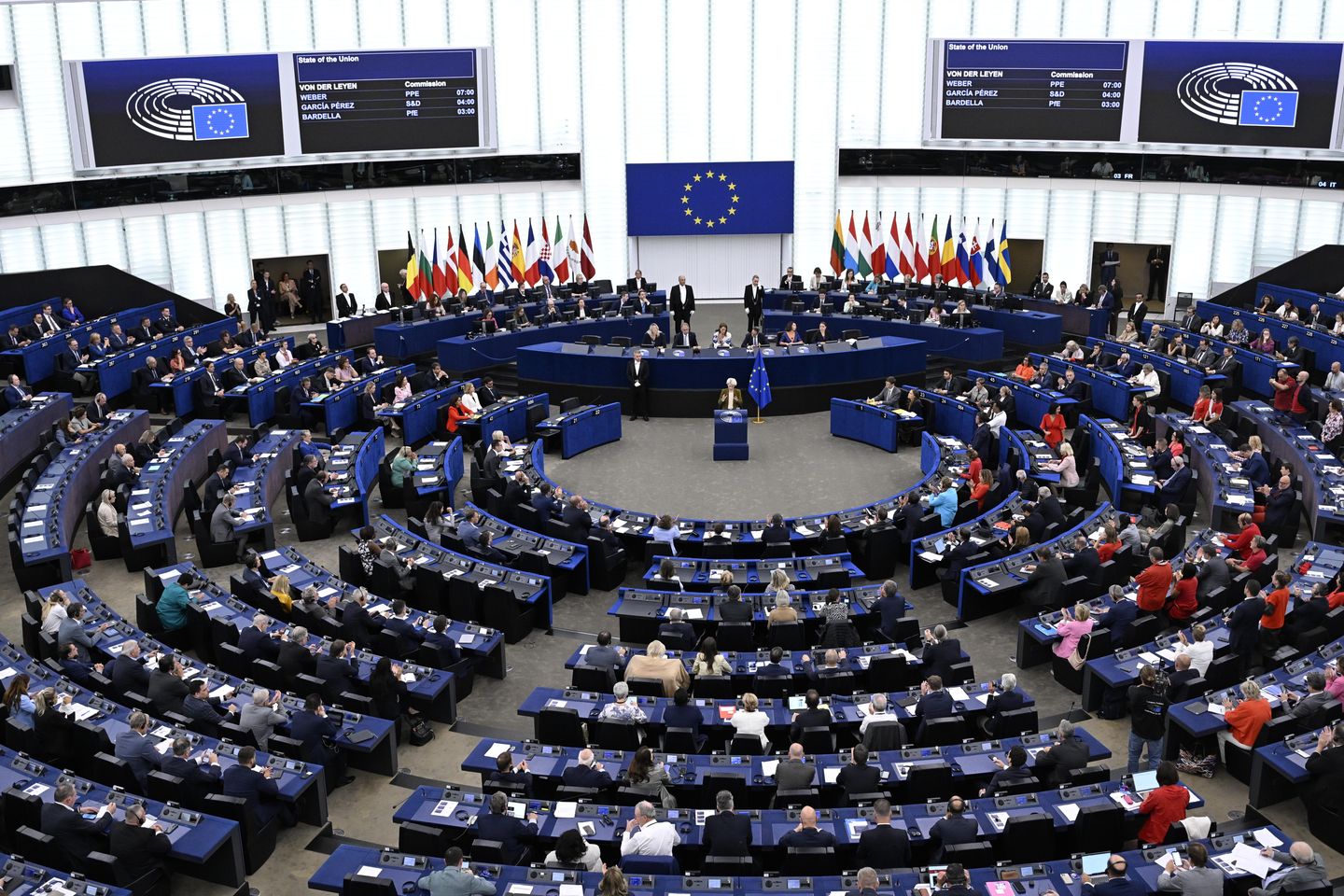
Conservatives and right-wing populists warn that a European Union initiative could become a state-controlled speech police.
The proposed European Center for Democratic Resilience, championed by European Commission President Ursula von der Leyen, is being sold as a bulwark against Russian influence campaigns.
“We will set up a new European Center for Democratic Resilience,” Ms. von der Leyen said during her State of the Union speech Tuesday. Her declaration was instantly met with jeers and hisses from conservative and populist members in the audience.
“You are obviously fearing this new center,” the 66-year-old German said as she paused for the decorum to return to the chamber, but disinformation is “so dangerous for our democracy, because informed citizens who can trust what they read and hear are essential to keep those in power accountable.”
She pledged that the next EU budget would include funding for the anti-disinformation effort and similar media initiatives, particularly for those living in “news deserts.”
Even critics acknowledge the serious threat posed by Russian disinformation, but many worry that the initiative will do more harm than good or be squandered. Some argue that national governments or NATO might be better positioned to respond to and handle hostile influence campaigns.
Proponents argue that a European-wide approach is necessary to counter an increasingly sophisticated challenge. Governments struggle to respond to new threats in an era of deepfakes, AI-generated content and microtargeted influence efforts that bypass traditional gatekeepers entirely.
“I fully support this,” said Sandro Gozi, a member of the European Parliament and secretary-general of the European Democratic Party. “We must do it, and quickly, with the framework of our European Democracy Shield strategy. This is urgent.”
Ms. von der Leyen’s plan is part of her broader European Democracy Shield strategy, which calls for an “all-of-society” approach to disinformation. Yet in the many European nations that still bear the scars of communist and fascist censorship, such language can be alarming.
“Countering foreign disinformation must never become a pretext to muzzle those who disagree,” said Vijay Monany, deputy secretary-general of the populist-right Europe of Sovereign Nations Group. “Europe should defend open debate and not create a ministry of truth.”
He noted that the fight against “disinformation” or “foreign interference” is often used as a pretext to restrict debate, limit free expression and silence the voices of dissent and opposition. He also made clear that the Europe of Sovereign Nations supports robust action against foreign interference and criminal information operations.
One of the most prominent members of the Europe of Sovereign Nations is the Alternative for Germany, known for its hawkish views on immigration. The right-wing party holds a plurality of ESN groups within the European Parliament and leads in opinion polling in Germany. To AfD’s critics, it’s a far-right extremist party and was previously labeled as such by the German government.
NetzDG, a law enacted in Germany in 2017 to combat disinformation, continues to be a political football.
The law mandated that platforms remove hateful content, in some cases within 24 hours, or face legal action. In 2021, Google filed a lawsuit against the law. The AfD has said such efforts overmoderate content to its disadvantage.
Last year, Spain’s socialist government implemented a plan to stop the spread of “fake news,” which was immediately criticized by the opposition People’s Party, Spain’s traditional conservative party.
Now, Ms. von der Leyen’s plan has conservatives on edge.
“At the moment, the detail is imprecise,” said Stephen Jones, spokesperson for the European Conservatives and Reformists Group, an alliance of leading social conservative and nationalist voices in the European Parliament.
“But that was surely deliberate because the EU’s work to combat disinformation is a sensitive issue, especially for parliamentarians from former Soviet Bloc countries, many of whom find the idea of authorities taking action in this field to be unacceptable — especially if, as is sometimes the case, the approach is selective and biased against conservatives.”
It’s precisely those European countries that have been disproportionately targeted by Russian disinformation over the past decade. Russia has also not exclusively targeted right-wing groups for disinformation efforts.
Russian bots on social media have been pushing content supporting Catalan independence.
Conservatives in Europe cheered in February when Vice President J.D. Vance criticized Germany’s attempts to limit “hate speech.” Imposing such limits to curb extremism and incitement has led to authorities policing the internet.
“There are thousands upon thousands of American troops in Germany today. Do you think that the American taxpayer is going to stand for that, if you get thrown in jail in Germany for posting a mean tweet? Of course they’re not,” Mr. Vance told a conservative gathering.
In a speech at the Munich Security Conference earlier in February, Mr. Vance lectured European leaders about the state of democracy and free speech across the Continent. Multiple European leaders, including German Chancellor Olaf Scholz, rebuked his comments.
“Obviously, we’re going to continue to have important alliances with Europe,” Mr. Vance said later. “But I really do think the strength of those alliances is going to depend on whether we take our societies in the right direction.”
With European elections looming in several countries and Ms. von der Leyen’s approval ratings slipping in polls, Brussels must walk a careful tightrope, countering malign influence without eroding the freedom and democracy it seeks to protect.













